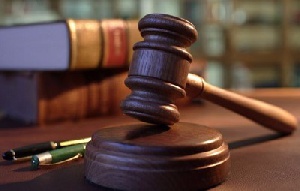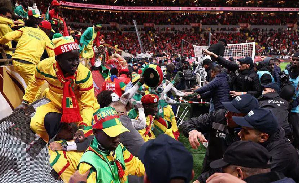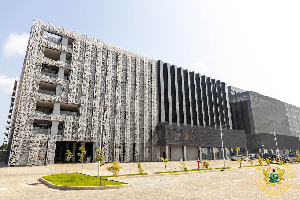Central University College’s Professorial Chair in Economic Governance: In whose interest?
The Central University College (CUC) took a big, bold step forward recently when it decided to establish a professorial chair in economic governance. Professorial chairs, also known as endowed chairs or academic chairs, are not common in our part of the world. In the developed world where they are common, these chairs are established mostly by corporate organizations or wealthy individuals who endow these chairs with big financial donations to help generate knowledge in specific academic disciplines in order to help advance the cause of society. This means that academic chairs are almost always established only at research-intensive universities. A person who occupies an academic or endowed chair (that is, the chair holder) is thus a highly knowledgeable individual, carefully selected to ensure the objectives for which the chair is established are realized. Therefore, deciding who occupies an academic chair is such a big deal.
A Daily Graphic online report of 17th March, 2014, announcing the establishment of the CUC’s Professorial Chair in Economic Governance said the chair was established by “the Central University College through the William Ofori-Atta Institute of Integrity (WOAII)”. The report also communicated the appointment of Dr. Mahamudu Bawumia to the chair, and he has since been described as a Visiting Professor of Economic Governance at the CUC.
While there is no doubt that the holder of the CUC’s academic chair in economic governance is a very knowledgeable economist, the fact that he is neck-deep in partisan politics often raises questions about his objectivity in analysing issues of economic governance in Ghana. In fact, Dr. Bawumia is not only neck-deep in partisan politics; he is also the vice presidential nominee for Ghana’s largest opposition party, the NPP, for the 2016 election, and has been vice presidential candidate for the elections past in 2008 and 2012. This fact of his partisanship has made some Ghanaians suggest that he uses the lectures he delivers, as part of his duties as the CUC’s economic governance chair holder, to advance his political interests rather than academic interests. While this suggestion has been debated in the public space, it would appear that that debate is effectively coming to a close as there is now an unfortunate revelation of “a deliberate design” to use academic platforms to advance a political party interest. How?
--- Mr. Paul Afoko and the revelation ---
On the mid-day news of 6th April, 2015, on Accra-based radio station Joy FM, NPP national chair Mr. Paul Afoko made comments that, in my opinion, may forever change the debate on whether or not Dr. Bawumia is an objective analyst of Ghana’s economy. Mr. Afoko’s comments may have tipped the balance away from those who have asserted that Dr. Bawumia has been an objective analyst, in favour of those who have been arguing that his analyses have been tainted by partisan considerations.
In the news item, which was repeated on the 6 pm news, Mr. Afoko would be heard revealing that it has been his party’s decision to let Dr. Bawumia play lead roles in the party’s 2016 election campaign. But that is not the problem. He suggested, too, among others, that the recent lecture delivered by Dr. Bawumia at the CUC (in his capacity as holder of the CUC’s academic chair in economic governance, not as a political figure) is part of the effort to let him take front role in the party’s campaign going into 2016, and more surprisingly, that if Dr. Bawumia is going to deliver a lecture and the party thinks it won’t give it an advantage, they will ask him not to. This is where the problem is. This revelation by Mr. Afoko would immediately suggest that academic institutions (and in this case, the CUC) may lend themselves to manipulation by political forces. This is very unfortunate. And while I am in no position to verify whether the CUC’s chair in economic governance was purposely created to advance a political cause, the revelation by Mr. Afoko does bring to the fore some key questions.
First, why did the CUC decide to appoint Dr. Bawumia its chair in economic governance knowing very well that he comes from a background that potentially (and maybe ultimately?) renders him unable to proffer an objective academic opinion on matters of economic governance in Ghana? The fact that Dr. Bawumia is a vice presidential nominee means he will be one of the two biggest “beneficiaries” of any change in government that may happen after the 2016 polls (assuming his party wins), a change that may be attributable to “poor economic governance” by the incumbent government. Therefore, will Dr. Bawumia be interested in doing an objective academic analysis of the Ghanaian economy? If yes, will that advance his party’s cause considering Mr. Afoko’s revelation? If no, how does that affect the reputation of the CUC?
Perhaps the foregoing questions would be better appreciated were one to consider one of the biggest controversies from Dr. Bawumia’s recent lecture at the CUC. In his lecture, Dr. Bawumia “revealed” that Ghana has been sanctioned recently by the AfDB for failing to honour its obligations to the bank. However, the bank issued a statement soon afterwards, claiming that although it had placed Ghana on the sanctions list, it happened through an error on its part, and that, after all, Ghana was not on its sanctions list. Consequently, the question that has been asked of Dr. Bawumia is whether he was aware that Ghana’s placement on the sanctions list was an error which was subsequently corrected, and yet chose to state the “erroneous position” in order to advance his political interest. This, in my opinion, is quite a critical question.
Second, if Dr. Bawumia becomes vice president in 2017, will he still hold the academic chair? I guess the position of vice president is a full-time job, and therefore, he will have to vacate the chair. So, will that be the end of the academic chair? If so, what does that suggest?
Third, who provides funding for the CUC’s chair in economic governance? Is it the CUC or the WOAII (or both) or some other “interested party”? And how do the funders, who apparently should be interested in the integrity of scholarship and academic processes and systems, view Mr. Afoko’s revelations? The significance of these questions will become clear very shortly.
Fourth, does Dr. Bawumia as holder of the CUC’s economic governance chair have the complete “independence of judgment” required of scholars? Or does he discuss his “research findings” with other parties (including the funders of his chair) who may decide whether he publishes/publicizes those results or not? This is important because Mr. Afoko tells us that his party will impress upon Dr. Bawumia not to deliver a lecture they think will not advance the party’s cause.
--- Conflict of interest in academia ---
The above questions, and more, lead me to the issue of conflict of interest in academia. Indeed, a very standard academic practice today is that when academics are communicating their research findings, usually in academic journals, they disclose any conflict of interest they may have. In fact, it is not just a practice; it is now a requirement imposed by many academic journals so that many academics go all out to show that what they communicate to their peers and the general public as their “research findings” is not in any way influenced by their biases and affiliations, or by external forces.
Most significantly, statements such as “the funders have no role in the design of experiments/research, data collection and analysis, preparation of manuscript, and the decision to publish” are frequently found at the end of published research papers. One reason is that these days, when government funding for research is dwindling all across the world and private organizations and individuals are taking lead roles in providing funding for research, expertise alone is no longer enough in academia.
While you may be an expert in an academic field, your peers and the general public would want to know whether or not your “research findings” have been influenced by other considerations or biases, including those who funded the research. This enables your peers and the general public to carefully evaluate your “research findings” in the light of potential conflicts of interest, or conflicts of interest, where they exist, so as to be able to place their own value judgments on those “research findings”. In other words, people are not obliged to take an expert’s “research findings” simply because he/she is an expert; it is expected that expertise must go hand-in-hand with credibility. At this point, should you be interested in knowing more about conflict of interest in research, please see the following link to a case of conflict of interest in research being watched closely right now: (http://insideclimatenews.org/news/06042015/fracking-study-water-contamination-under-ethics-review).
The foregoing suggests that if people cannot vouch for the credibility of an academic because his views/findings can be proven to be tainted by other considerations, the academic in question will be unable to make the impact he or she desires, and the academic institution for which he/she works will be the ultimate loser. Indeed, the world’s most prestigious knowledge institutions have been able to attain their “prestige status” mainly because their research have had, and continue to have, a great impact on the world. This means that if a university’s scholars have placed themselves in conflict of interest positions, their research results have little to zero impact because the results are often looked at with suspicion or completely ignored. There have been cases where failure to disclose conflict of interest by academics when publishing their research results have led to the expression of concern or the outright retraction/withdrawal of the published papers by journal editors. Consequently, in order to increase the impact of their research and to raise their profile, universities and academics almost always try to avoid placing themselves directly in conflict of interest positions.
This is why, in my opinion, the CUC should have looked carefully before deciding on who holds its chair in economic governance because I tend to agree with those who say Dr. Bawumia is seriously conflicted in his role as the CUC’s economic governance chair holder. While the CUC, like any other independent tertiary institution reserves the right to decide who holds its academic chairs, it is important that in its own interest and in the interest of advancing the frontiers of scholarship, it safeguards time-tested academic practices and principles. In fact, all knowledge institutions, whether private or public, should be interested in upholding these principles, because, in the end, these alone will enable knowledge institutions to create formidable knowledge economies and to chart the pathways to sustainable societies. Thus, ultimately, the question that remains is: “Is Dr. Bawumia the right candidate to hold the CUC’s chair in economic governance, especially in the light of Mr. Afoko’s revelations?”
Author: Israel D. K. Agorsor
University of Cape Coast
7th April, 2015.
E-mail: iagorsor@ucc.edu.gh
Opinions of Sunday, 12 April 2015
Columnist: Agorsor, Israel D. K.














